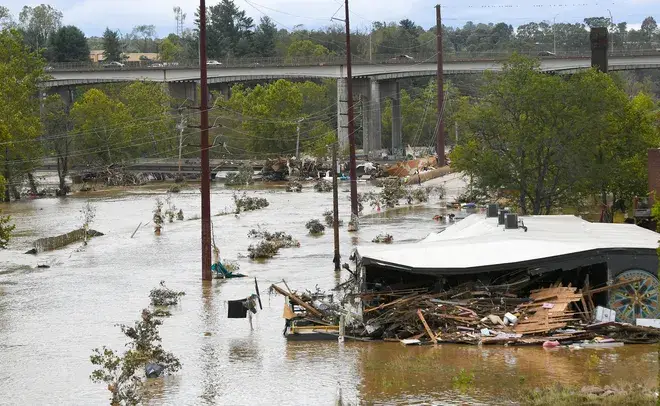Republican Attacks on FEMA Hurt Americans!
Introduction
There is no question – The Republican attacks on FEMA hurt Americans.
In times of natural disasters—whether it’s hurricanes, wildfires, floods, or tornadoes—Americans have historically relied on the Federal Emergency Management Agency (FEMA) for disaster relief and recovery. However, in recent years, FEMA has increasingly found itself under attack from conservative lawmakers, particularly within the Republican Party. These attacks often center around reducing FEMA’s funding, scaling back federal disaster assistance, and advocating for state and local governments to handle disaster response independently. These actions not only weaken FEMA’s ability to help disaster-stricken communities but also leave vulnerable Americans exposed to greater risks. This blog explores the consequences of Republican opposition to FEMA, highlighting specific officials who have historically opposed disaster recovery assistance, and the lasting impact on our nation’s ability to respond to crises.
Republican Opposition to FEMA: A Historical Overview
Calls to Privatize Disaster Response Many Republican lawmakers have long argued that disaster relief and recovery efforts should not be the responsibility of the federal government. They have advocated for privatization, suggesting that state and local governments, or even private companies, should handle disaster management. This approach overlooks the reality that disasters often overwhelm local resources, and federal assistance is crucial for large-scale recovery efforts.
Example: Former Republican Congressman Ron Paul was one of the most vocal critics of FEMA. He famously argued that FEMA should be abolished, claiming that it was ineffective and that disaster recovery should be left to local governments and the private sector. His son, Senator Rand Paul, has also been a consistent opponent of federal disaster aid, voting against relief packages following hurricanes and other natural disasters.
Blocking Disaster Relief Funds Over the past several decades, Republicans in Congress have repeatedly opposed efforts to increase funding for FEMA or blocked disaster relief packages entirely. Often, these lawmakers argue that disaster aid must be offset by cuts to other federal programs, even when immediate relief is needed to address the aftermath of a disaster.
Example: Following Hurricane Sandy in 2012, Republican lawmakers, including Senator Ted Cruz of Texas, opposed a $50.5 billion aid package for victims of the storm. Cruz argued that the package was filled with unnecessary spending, even though much of it was dedicated to rebuilding infrastructure and assisting those left homeless by the disaster. This delay in aid hurt recovery efforts in states like New Jersey and New York, where residents waited months for critical assistance.
The Consequences of Undermining FEMA
Delayed Response and Recovery One of the most immediate consequences of Republican efforts to defund or block FEMA is the delay in response and recovery efforts after disasters. FEMA is responsible for coordinating federal resources, providing financial assistance to individuals and local governments, and overseeing long-term recovery efforts. When FEMA is underfunded or when disaster relief packages are delayed, it becomes harder for the agency to provide immediate assistance, leaving disaster victims to wait longer for help.
Example: After Hurricane Harvey devastated Texas in 2017, the state required significant federal assistance to recover from the flooding. However, prior efforts by Texas lawmakers like Ted Cruz to oppose federal disaster aid led to criticism when the state needed billions in FEMA funds to rebuild. The hypocrisy of opposing disaster aid for other states while demanding it for Texas highlighted the importance of federal assistance in recovery efforts.
Increased Burden on Local Governments Without sufficient FEMA support, state and local governments are left to shoulder the burden of disaster response on their own. While local governments play an essential role in immediate emergency response, they often lack the financial resources to fund long-term recovery efforts. Rural communities, in particular, are vulnerable when FEMA is weakened, as they often have fewer resources and rely more heavily on federal assistance.
Example: In 2020, Senator Ron Johnson of Wisconsin blocked a disaster relief package meant to address widespread flooding and other natural disasters across the Midwest. Johnson’s opposition to federal aid left many rural communities struggling to rebuild without adequate resources, highlighting the dangers of relying solely on state and local governments to handle major disasters.
Greater Vulnerability to Climate Change As climate change accelerates, the frequency and severity of natural disasters are expected to increase. From stronger hurricanes to more intense wildfires, FEMA will play an increasingly critical role in helping communities respond to and recover from these events. By weakening FEMA through budget cuts and opposition to disaster aid, Republican lawmakers are making it harder for the nation to address the growing threat posed by climate change.
Example: In recent years, Representative Mo Brooks of Alabama has voiced opposition to using federal funds for disaster relief, even as his state faces an increasing number of tornadoes and severe storms linked to climate change. As the effects of climate change worsen, the need for strong federal disaster response will only grow. Yet, continued attacks on FEMA by conservative politicians threaten the agency’s ability to effectively manage these crises.
Why We Need FEMA and Federal Disaster Assistance
A Coordinated National Response Disasters don’t respect state lines, and they can quickly overwhelm the resources of any one state or local government. FEMA’s role in coordinating a national response is essential for ensuring that states have access to the personnel, equipment, and financial resources they need to respond to disasters. Federal disaster assistance also ensures that all Americans, regardless of where they live, have access to help when they need it most.
Long-Term Recovery Efforts FEMA doesn’t just respond to immediate emergencies; it also oversees long-term recovery efforts. This includes rebuilding infrastructure, providing housing assistance to displaced residents, and helping communities become more resilient to future disasters. Without sufficient federal assistance, many communities would struggle to recover fully from disasters, leaving them vulnerable to future crises.
Conclusion
The repeated attacks on FEMA by Republican lawmakers have left the United States less prepared to deal with the increasing number of natural disasters that are occurring each year. From blocking disaster relief packages to advocating for privatization, conservative opposition to federal disaster assistance has had real consequences for communities across the country. As climate change intensifies the frequency and severity of disasters, the need for a strong, well-funded FEMA has never been greater.
It’s time to recognize that disaster relief is not a partisan issue—it’s a matter of public safety and human dignity. The residents of hurricane-prone coastal areas, wildfire-threatened states, and flood-vulnerable regions depend on FEMA to provide the assistance they need in times of crisis. Weakening this critical agency only makes it harder for the country to respond to the challenges ahead.
Call to Action
We must demand that our elected officials prioritize disaster recovery and fully fund FEMA to ensure that all Americans have access to critical assistance during times of need. Get involved, stay informed, and vote for leaders who understand the importance of disaster preparedness and recovery.
Resources for More Depth
- FEMA: History and Role in Disaster Recovery
This article explores the history of FEMA and the critical role it plays in coordinating federal disaster response.
Link: https://www.fema.gov/about/history - The Impact of Budget Cuts on FEMA’s Ability to Respond to Disasters
This piece examines how recent budget cuts have impacted FEMA’s capacity to respond effectively to major disasters.
Link: https://www.nytimes.com/2021/08/31/us/politics/fema-budget-cuts.html - The Role of FEMA in Climate Change Adaptation
Learn more about how FEMA is adapting its disaster recovery efforts in the face of climate change.
Link: https://www.theguardian.com/us-news/2022/sep/02/fema-climate-change-us-disasters
Help Red District Democrats by Donating Here
URL: https://wecompetepac.com/help-red-district-dems-by-donating-here/




